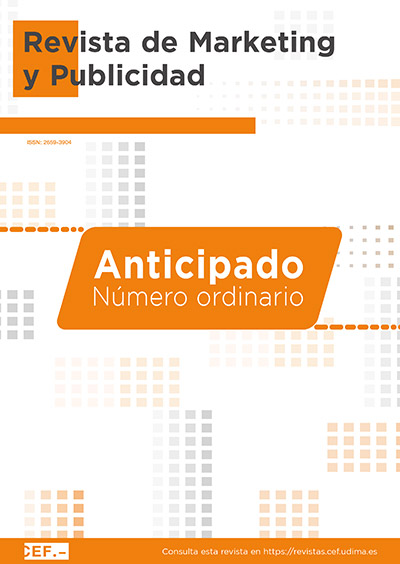Marketing, influencers and similarity: personality traits shared with its followers
DOI:
https://doi.org/10.51302/marketing.2024.21397Keywords:
influencers, personality, followers, social media content, leadership, marketing 2.0, brand advocatesAbstract
The following research aims to identify possible similarities in personality traits between influencers from Cuenca and their followers through the application of the Myers-Briggs test. An exhaustive study is conducted with the objective of determining if there are shared personality characteristics between these two groups. In the first phase of the study, the test is administered to participants to assess their personality. Subsequently, participants are classified according to the results obtained, facilitating the identification of predominant personality traits.
Following the initial phase, a detailed analysis of the influencers is carried out, taking into account various criteria related to their leadership style and personality. This analysis is conceived with the purpose of providing a deeper explanation of the possible underlying causes of the similarities or differences observed between influencers and their followers.
Upon conclusion, it is demonstrated that personality type, leadership style, content, and message approach are closely related to the results obtained. It is observed that influencer A does not share personality traits with her followers, while influencer B does exhibit similarities in personality with her audience. This finding underscores that similarity in personality between influencers and their followers is not necessarily a constant, but rather conditioned by factors such as leadership style, content, and message approach.
Downloads
References
Andrade Sánchez, E. D., Velasco Donoso, P. y Gallardo Pérez, N. A. (2022). Influencers o prescriptores: preferencias de las marcas en la divulgación publicitaria. Revista Publicando, 9(34), 57-71. https://doi.org/10.51528/rp.vol9.id2320
Cambridge Dictionary. (2023). Foodie. https://dictionary.cambridge.org/es/diccionario/ingles/foodie
Catucci, A. (2020). Importancia de influencers en la comunicación de empresas. Marketing Insider Review. https://marketinginsiderreview.com/influencers-comunicacion-empresas/#:~:text=Los%20microinfluencers%20proporcionan%20frescura%2C%20innovaci%C3%B3n,cada%20vez%20se%20busca%20m%C3%A1sL
Geyser, W. (2023). What is influencer marketing? - The ultimate guide for 2023. Influencer Marketing Hub. https://influencermarketinghub.com/influencer-marketing/#toc-1
Gómez Obregón, M. G. (2023). Factores de atracción interpersonal. PsicoActiva.com: Psicología, test y ocio Inteligente. https://www.psicoactiva.com/blog/factores-de-atraccion-interpersonal/
Hernández, R. (2023). Por qué las empresas utilizan el indicador MBTI, el test de Myers-Briggs basado en 16 tipos de personalidad, para seleccionar candidatos. HRTRENDS. https://empresas.infoempleo.com/hrtrends/indicador-mbti-el-test-de-myers-briggs-de-personalidad-para-seleccionar-candidatos/
Jaramillo Andrade, A. y Solórzano Rojas, S. N. (2021). Rasgos de personalidad de los influencers de la red social Instagram entre 20-45 años de la ciudad de Cuenca [Trabajo de graduación. Universidad del Azuay].
Manosalvas Vaca, L. O., Tobanda Barragán, A. A., Manosalvas Vaca, C. A. y Quevedo Amay, D. V. (2021). Liderazgo transformacional y transaccional en la autoeficacia emprendedora del turismo comunitario amazónico, caso provincia de Pastaza. INNOVA Research Journal, 6(1), 1-17. https://doi.org/10.33890/innova.v6.n1.2021.1393
Martínez, M. (2018). ¿De verdad sirve el test de personalidad MBTI? Hablemos de empresas. https://hablemosdeempresas.com/general/verdad-sirve-test-personalidad-mbti/
Medina, K. R. (2022). Estadísticas de la situación digital en Ecuador 2021-2022. Branch Agencia. https://branch.com.co/marketing-digital/estadisticas-de-la-situacion-digital-en-ecuador-2021-2022/
Meza Tuárez, K. (2015). Estudio de cuestionario psicométrico según indicadores de Myers-Briggs (MBTI) [Tesis de grado. Universidad de Guayaquil].
Muñoz Cardona, M. (2019). La interacción de los influencers con sus seguidores desde el punto de vista de la psicología social. [Trabajo de fin de grado. Universidad de Valladolid]. http://uvadoc.uva.es/handle/10324/37360
PuroMarketing. (2023). Influencers y prescriptores de marca: ¿por qué confiamos en sus recomendaciones y por qué han ganado tanta popularidad en las estrategias de marketing? PuroMarketing. https://www.puromarketing.com/44/211950/influencers-prescriptores-marca-confiamos-recomendaciones-ganado-tanta-popularidad-estrategias-marketing
Quenk, N. L. y Kummerow, J. M. (2015). Informe de interpretación. Myers-Briggs Type Indicator. Paso II. https://eu.themyersbriggs.com/-/media/Files/PDFs/Reports-in-other-languages/MBTI-Step-II/MBTI_Step_II_Interpretive_Report_Spanish.pdf
Quer, A. (2019). Por qué las organizaciones recurren al test de personalidad Myers-Briggs (MBTI). Growlia. https://growlia.com/por-que-las-organizaciones-recurren-al-test-de-personalidad-myers-briggs-mbti/
Ricaurte, M. E. (2019). El rol de los influencers en la comunicación actual [Blog de comunicación corporativa. UDLA]. https://marketing.udla.edu.ec/comunicacion/
Downloads
Published
Versions
- 2024-11-07 (2)
- 2024-06-13 (1)
How to Cite
Issue
Section
License
Copyright (c) 2024 Pablo Arturo González Loyola, Paul Andrés Correa Jiménez , Pablo Andrés Pugo Bacuilima

This work is licensed under a Creative Commons Attribution-NonCommercial-NoDerivatives 4.0 International License.





















